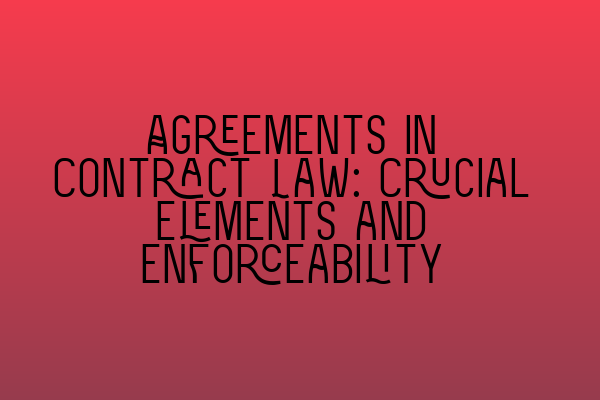Agreements in Contract Law: Crucial Elements and Enforceability
Introduction
In the world of business, agreements form the backbone of countless transactions and relationships. These legal documents serve as a means of ensuring understanding, establishing obligations, and delineating expectations between parties involved. Contract law plays a fundamental role in governing agreements, providing a framework for their creation, interpretation, and enforcement. In this comprehensive guide, we will delve into the crucial elements that help make agreements valid and enforceable.
1. Offer and Acceptance
A contract begins with an offer from one party to another. This offer must be clear, specific, and made with the intention of creating a legally binding agreement. The person receiving the offer, known as the offeree, must then accept the terms offered without any modifications or conditions. Acceptance can be expressed verbally, in writing, or through conduct.
Keywords: offer, acceptance, legally binding agreement, offeree, express acceptance, conduct acceptance
2. Consideration
Consideration refers to something of value that each party gives or promises to give to the other as part of the agreement. It may be in the form of money, goods, services, or even a promise to do or refrain from doing something. This exchange of consideration ensures that both parties have a mutual understanding and commitment to the agreement.
Keywords: consideration, value, mutual understanding, commitment, exchange
3. Intention to Create Legal Relations
For a contract to be enforceable, both parties must demonstrate an intention to create legal relations. This means that they intend for their agreement to be legally binding, rather than merely a casual or social arrangement. Business agreements generally carry a presumption of intention to create legal relations, but this can vary in certain circumstances.
Keywords: intention to create legal relations, legally binding, business agreements, presumption
4. Capacity and Legality
To be valid, the parties involved in a contract must have the legal capacity to enter into the agreement. This generally requires that they have reached the age of majority, are of sound mind, and have not been coerced or induced by fraudulent means. Additionally, the subject matter of the contract must be legal and not against public policy.
Keywords: capacity, legality, age of majority, sound mind, coercion, fraudulent means, subject matter, public policy
5. Certainty of Terms
An essential element of a valid contract is the certainty of its terms. The agreement must be clear, precise, and free from ambiguity. It should specify the rights and obligations of both parties, including the time, price, and manner of performance. Vague or incomplete agreements may not be enforceable as the courts require certainty to uphold contracts.
Keywords: certainty of terms, clear, precise, ambiguity, rights, obligations, time, price, manner of performance, enforceable
6. Enforceability
Once a valid agreement has been formed, it is crucial to understand its enforceability. A contract can be enforceable in different ways, such as through specific performance, where the court orders a party to carry out their obligations; or through monetary damages, where the injured party is compensated for losses suffered due to a breach of contract. The enforceability of a contract may be affected by factors like illegality, mistake, misrepresentation, or duress.
Keywords: enforceability, specific performance, monetary damages, breach of contract, illegality, mistake, misrepresentation, duress
Conclusion
In the complex world of contract law, agreements serve as the foundation for countless business transactions. Understanding the crucial elements of a valid and enforceable contract is essential for protecting your rights and ensuring that agreements are upheld. By considering factors such as offer and acceptance, consideration, intention to create legal relations, capacity and legality, certainty of terms, and enforceability, parties can navigate the intricacies of contract law with confidence.
Remember, seeking legal advice from a qualified solicitor is always recommended when dealing with complex contractual matters.
